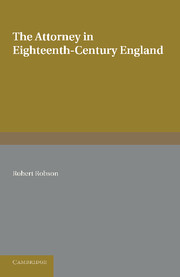Book contents
- Frontmatter
- Dedication
- Contents
- General Editor's Preface
- Preface
- Chapter I Attorneys and Solicitors Before 1700
- Chapter II Regulation of the Profession
- Chapter III The Society of Gentlemen Practisers
- Chapter IV The Provincial Law Societies
- Chapter V The Making of an Attorney
- Chapter VI The Attorney in Local Society
- Chapter VII Estates and Elections
- Chapter VIII Administration and Finance
- Chapter IX Two Attorneys
- Chapter X The Road to Respectability
- Appendix I The Apprenticeships of Richard Carre and Samuel Berridge
- Appendix II The Admission of an Attorney
- Appendix III Christopher Wallis: Notes from the Journal
- Appendix IV A Note on Numbers
- Appendix V The Professions in the Eighteenth Century: a Bibliographical Note
- List of Primary Sources
- Index
- Frontmatter
- Dedication
- Contents
- General Editor's Preface
- Preface
- Chapter I Attorneys and Solicitors Before 1700
- Chapter II Regulation of the Profession
- Chapter III The Society of Gentlemen Practisers
- Chapter IV The Provincial Law Societies
- Chapter V The Making of an Attorney
- Chapter VI The Attorney in Local Society
- Chapter VII Estates and Elections
- Chapter VIII Administration and Finance
- Chapter IX Two Attorneys
- Chapter X The Road to Respectability
- Appendix I The Apprenticeships of Richard Carre and Samuel Berridge
- Appendix II The Admission of an Attorney
- Appendix III Christopher Wallis: Notes from the Journal
- Appendix IV A Note on Numbers
- Appendix V The Professions in the Eighteenth Century: a Bibliographical Note
- List of Primary Sources
- Index
Summary
In the preceding volume in this series Professor Plucknett, in a masterly first chapter entitled ‘Maitland's View of Law and History’, shows that the notion, if it were entertained, that legal history must be annexed to the study of law would be entirely misconceived, and that to make legal history the preserve of professional lawyers would indeed be to condemn it to extinction. A glance at the list of authors in this series of studies shows that, if the general editor had been compelled to limit his choice to qualified lawyers, the series would long ago have come to an end.
Once more the general editor has prayed in aid the sister faculty, with he believes great profit to the student of legal and social history. The pages of the popular press show how large a part law and lawyers play in the social life of the present day. It has always been so, and yet in any book on social history the proportion of it which is devoted to the functioning of the law is far smaller than that topic merits. The reason for this defect is, no doubt, the fact that the writer of a general survey must base himself on the detailed research of others, and that research upon the relation of law to life has been meagre. But gaps are being filled. The most notable modern contribution in this field has been that of Professor Bertha Putnam to our knowledge of the work of justices of the peace in the Middle Ages. It is fortunate that one of the leaders in eighteenth-century studies set to Dr Robson the task of bringing similarly to life the attorney of the latter period. It was an exacting task for it required the scrutiny of archives ranging from Essex to Cumberland.
The title of his book will puzzle the many who do not know that attorneys and solicitors were separate classes of the legal profession until the middle of the eighteenth century. The amalgamation of those two branches, and the supersession of the more ancient and dignified title by the more modern and lowly one, are part of Dr Robson's story.
- Type
- Chapter
- Information
- The Attorney in Eighteenth-Century England , pp. ix - xPublisher: Cambridge University PressPrint publication year: 2013



